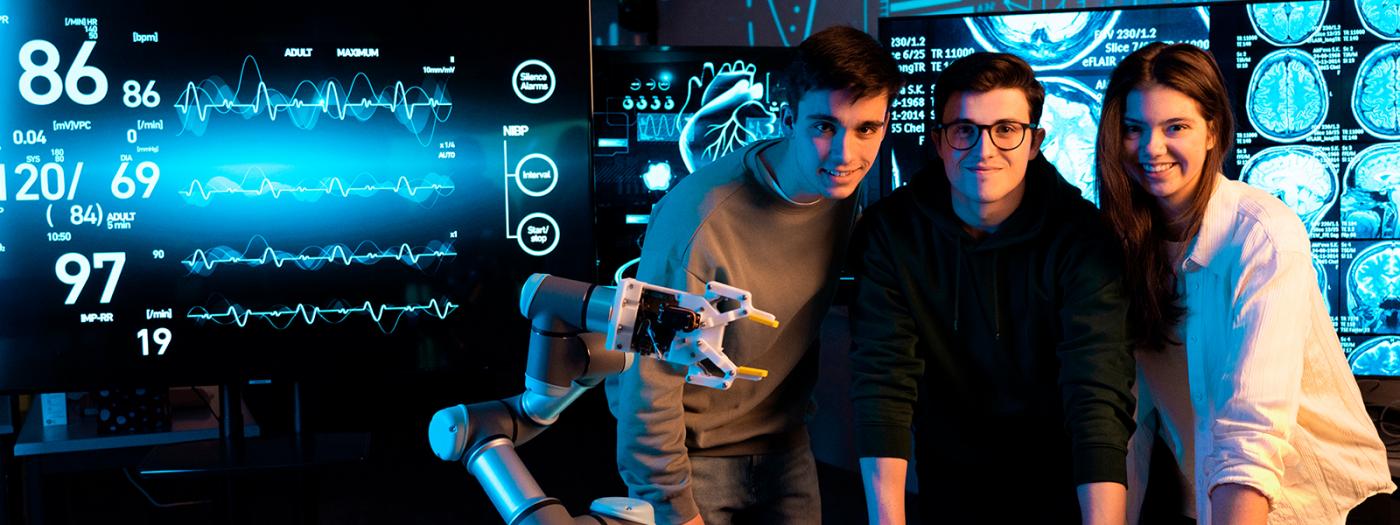This subject delves into the analysis, design and applications of electronic circuits with diodes, transistors (bipolar and unipolar) and operational amplifiers.
Titular Professors
Electronics fundamentals.
Students acquire the knowledge and develop the skills indicated below:
1. Master the basic concepts of electronic circuit theory.
2. Application of electronics to solve engineering problems.
3. Design analog and digital electronic circuits for health engineering applications, such as sensors and medical instrumentation.
4. Identify and have the ability to apply knowledge in practice, in electronics problems in a laboratory environment within a work team.
1. Diodes
2. Transistor polarization
3. Small-signal transistor analysis.
4. Frequency response of the amplifiers.
5. Feedback.
6. Analysis of BODE diagrams
7. Operational amplifiers.
8. Nonlinear applications of operational amplifiers.
The methodology used in this subject separates classes into two types: theoretical and practical.
Within the theoretical classes, basically what is taught are master classes in which the theoretical content of the subject is explained and related problems are solved. In each theory block, problems are proposed for students to do at home and deliver to the teacher in order to carry out a more continuous evaluation. Likewise, within these classes, some are dedicated to proposing problems and having students solve them in situ, so that the student actively participates in them.
The practical classes try to capture in practical examples everything that is being explained in class throughout the year. To carry out practical classes in the electronics laboratory, students are divided into smaller groups and a teacher is assigned per group. These classes are in person and are always done with the teacher at your side to advise on whatever is necessary. Students carry out their practices in groups of two.
The assessment elements for this subject are exams: mid-term, final (regular and extraordinary sessions), continuous assessment exercises (completed in and out of class) and laboratory sessions.
The final grade for the subject will be calculated by weighting two grades: the exam grade (Ex_Grade), which is highly significant, and
The grade for continuous assessment (Grade_AC), moderately significant: Final Grade = 70% · Ex Grade + 30% · AC Grade, provided that the Ex Grade is greater than or equal to 3.5; otherwise Final Grade = Ex Grade.
On the other hand, the exam grade will be calculated by weighting the mid-semester grades or Control Point (Ex_control_point) and the end-of-semester exam grade (Ex_final) according to the following calculation: Ex_Grade = 50% · Ex_final + 50% · Ex_control_point.
If Ex_punto_control ?5 the student will be able to take the final exam for only the second half of the subject.
Students who do not pass the theory exam during the regular June exam period will have an extraordinary exam period (July). In the extraordinary exam period, the final grade for each semester will be the highest of those obtained in the following calculations:
a) 70% of the recovery exam and 30% of the continuous assessment obtained during the semester (provided that the grade of the recovery exam is higher or equal to 3.5).
b) 100% of the recovery exam.
The continuous assessment grade is calculated from the following items:
- Exercises and/or tests done in class.
- Laboratory practices.
- Work done in class.
- Class participation
Llibre de problemes
Apunts d'Electrònica
J. Margalef, Anàlisi i Disseny de Circuits Analògics, Enciclopèdia Catalana, 1994
Boylestad, R. L., Nashelsky, L, Electrónica: Teoría de Circuitos y Dispositivos Electrónicos, PRENTICE HALL INC., 2009.
Rashid, M.H. Circuitos Microelectrónicos: Análisis y Diseño, Editor: International Thomson Editores, USA, 2000.
Rashid, M.H. Microelectronic Circuits Analysis and Design, Cengage Learning, USA 2011.
See electronic folder of the subject.
